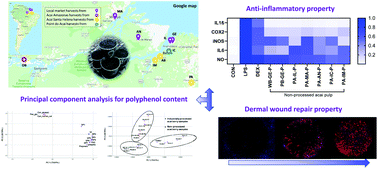Acai fruit is recognized for its health promoting properties. However, there is still a need to address the effects of industrial processing on this fruit. In this study, phenolic content, anti-inflammatory properties and dermal wound repair properties of 20 acai samples, before and after industrial processing, from various Amazon regions were investigated. Acai pulp was rich in total phenolics (18.9–58.8 mg g−1) and proanthocyanins (9.8–43.1 mg g−1), but contained trace anthocyanins (up to 0.1 mg g−1). Industrially processed samples lost substantial amounts of proanthocyanidins (up to 83.2%), while the anthocyanins inherently present were greatly enriched after processing (20-fold higher). Non-processed acai pulp extracts protected against early inflammation response which was correlated with proanthocyanidins, by significantly inhibiting nitric oxide production and suppressing pro-inflammatory gene expression including interleukin-1β, cyclooxygenase-2, nitric oxide synthase, and interleukin-6. The promotion of dermal wound repair of acai seed and pulp extracts was mainly contributed by anthocyanins and other bioactive compounds. The anti-inflammatory effect was diminished but wound healing effect was retained after pulp processing, suggesting the processing technology needs to be improved to maintain biological properties of acai fruit.

